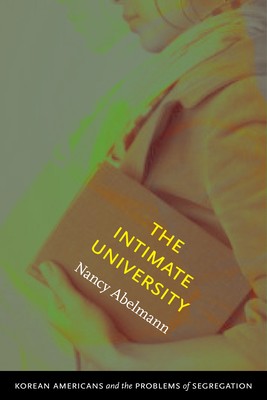
- We will send in 10–14 business days.
- Author: Nancy Abelmann
- Publisher: Duke University Press
- ISBN-10: 082234615X
- ISBN-13: 9780822346159
- Format: 15 x 22.6 x 1.5 cm, softcover
- Language: English
- SAVE -10% with code: EXTRA
Reviews
Description
The majority of the 30,000-plus undergraduates at the University of Illinois, Urbana-Champaign-including the large population of Korean American students-come from nearby metropolitan Chicago. Among the campus's largest non-white ethnicities, Korean American students arrive at college hoping to realize the liberal ideals of the modern American university, in which individuals can exit their comfort zones to realize their full potential regardless of race, nation, or religion. However, these ideals are compromised by their experiences of racial segregation and stereotypes, including images of instrumental striving that set Asian Americans apart. In The Intimate University, Nancy Abelmann explores the tensions between liberal ideals and the particularities of race, family, and community in the contemporary university.
Drawing on ten years of ethnographic research with Korean American students at the University of Illinois and closely following multiple generations of a single extended Korean American family in the Chicago metropolitan area, Abelmann investigates the complexity of racial politics at the American university today. Racially hyper-visible and invisible, Korean American students face particular challenges as they try to realize their college dreams against the subtle, day-to-day workings of race. They frequently encounter the accusation of racial self-segregation-a charge accentuated by the fact that many attend the same Evangelical Protestant church-even as they express the desire to distinguish themselves from their families and other Korean Americans. Abelmann concludes by examining the current state of the university, reflecting on how better to achieve the university's liberal ideals despite its paradoxical celebration of diversity and relative silence on race.
EXTRA 10 % discount with code: EXTRA
The promotion ends in 19d.13:06:15
The discount code is valid when purchasing from 10 €. Discounts do not stack.
- Author: Nancy Abelmann
- Publisher: Duke University Press
- ISBN-10: 082234615X
- ISBN-13: 9780822346159
- Format: 15 x 22.6 x 1.5 cm, softcover
- Language: English English
The majority of the 30,000-plus undergraduates at the University of Illinois, Urbana-Champaign-including the large population of Korean American students-come from nearby metropolitan Chicago. Among the campus's largest non-white ethnicities, Korean American students arrive at college hoping to realize the liberal ideals of the modern American university, in which individuals can exit their comfort zones to realize their full potential regardless of race, nation, or religion. However, these ideals are compromised by their experiences of racial segregation and stereotypes, including images of instrumental striving that set Asian Americans apart. In The Intimate University, Nancy Abelmann explores the tensions between liberal ideals and the particularities of race, family, and community in the contemporary university.
Drawing on ten years of ethnographic research with Korean American students at the University of Illinois and closely following multiple generations of a single extended Korean American family in the Chicago metropolitan area, Abelmann investigates the complexity of racial politics at the American university today. Racially hyper-visible and invisible, Korean American students face particular challenges as they try to realize their college dreams against the subtle, day-to-day workings of race. They frequently encounter the accusation of racial self-segregation-a charge accentuated by the fact that many attend the same Evangelical Protestant church-even as they express the desire to distinguish themselves from their families and other Korean Americans. Abelmann concludes by examining the current state of the university, reflecting on how better to achieve the university's liberal ideals despite its paradoxical celebration of diversity and relative silence on race.


Reviews